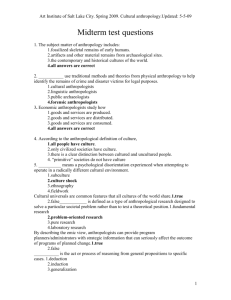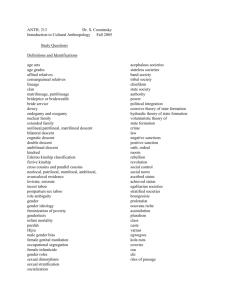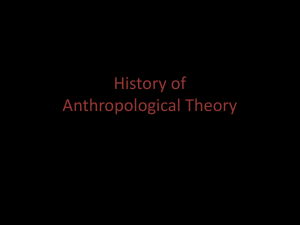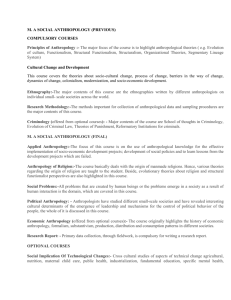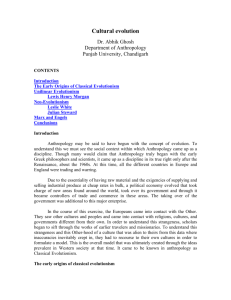A history of anthropology Chapter 2: Victorians, Germans and a
advertisement
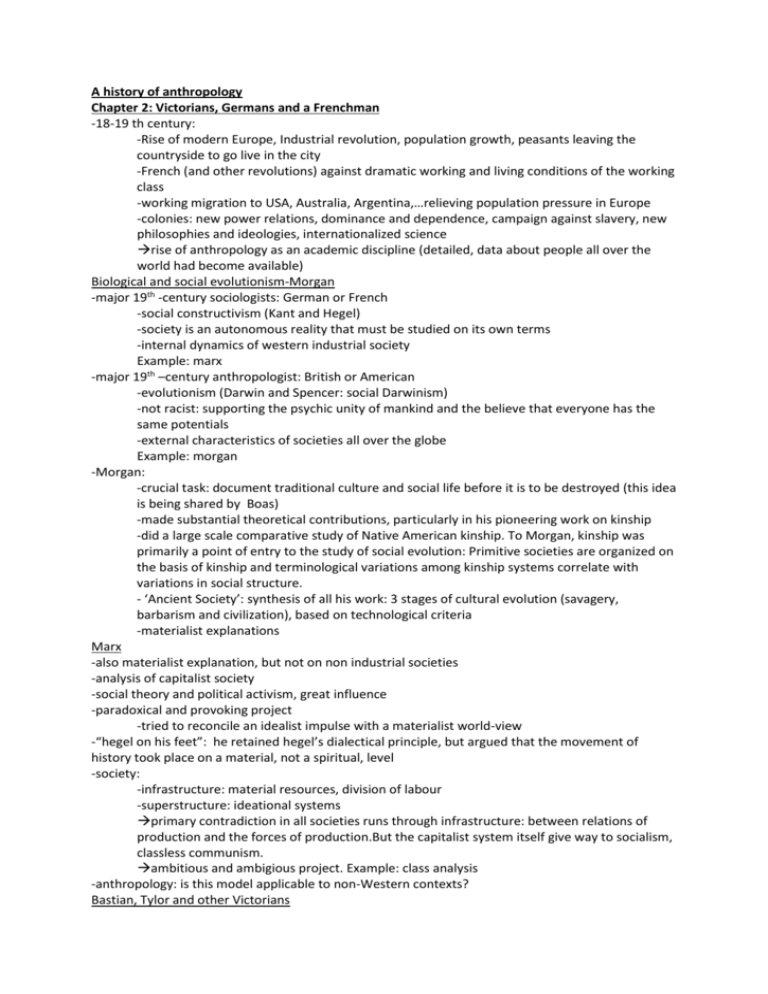
A history of anthropology Chapter 2: Victorians, Germans and a Frenchman -18-19 th century: -Rise of modern Europe, Industrial revolution, population growth, peasants leaving the countryside to go live in the city -French (and other revolutions) against dramatic working and living conditions of the working class -working migration to USA, Australia, Argentina,…relieving population pressure in Europe -colonies: new power relations, dominance and dependence, campaign against slavery, new philosophies and ideologies, internationalized science rise of anthropology as an academic discipline (detailed, data about people all over the world had become available) Biological and social evolutionism-Morgan -major 19th -century sociologists: German or French -social constructivism (Kant and Hegel) -society is an autonomous reality that must be studied on its own terms -internal dynamics of western industrial society Example: marx -major 19th –century anthropologist: British or American -evolutionism (Darwin and Spencer: social Darwinism) -not racist: supporting the psychic unity of mankind and the believe that everyone has the same potentials -external characteristics of societies all over the globe Example: morgan -Morgan: -crucial task: document traditional culture and social life before it is to be destroyed (this idea is being shared by Boas) -made substantial theoretical contributions, particularly in his pioneering work on kinship -did a large scale comparative study of Native American kinship. To Morgan, kinship was primarily a point of entry to the study of social evolution: Primitive societies are organized on the basis of kinship and terminological variations among kinship systems correlate with variations in social structure. - ‘Ancient Society’: synthesis of all his work: 3 stages of cultural evolution (savagery, barbarism and civilization), based on technological criteria -materialist explanations Marx -also materialist explanation, but not on non industrial societies -analysis of capitalist society -social theory and political activism, great influence -paradoxical and provoking project -tried to reconcile an idealist impulse with a materialist world-view -“hegel on his feet”: he retained hegel’s dialectical principle, but argued that the movement of history took place on a material, not a spiritual, level -society: -infrastructure: material resources, division of labour -superstructure: ideational systems primary contradiction in all societies runs through infrastructure: between relations of production and the forces of production.But the capitalist system itself give way to socialism, classless communism. ambitious and ambigious project. Example: class analysis -anthropology: is this model applicable to non-Western contexts? Bastian, Tylor and other Victorians Although Morgan and Marx overshadowed their contemporaries, they were far from alone -Bastian (German) -continued the German tradition of research on Volkskultur (inspired by Herder), criticized the simplistic evolutionist schemes (as only major 19th century anthropologist) -all cultures have a common origin from which they have branched off in various directions (cf boas later on) -historical connections between cultures, diffusionism, cultural relativism -Maine (Scottish) -tried to demonstrate how changes in legislation reflect wider social changes -distinguished traditional societies, based on status and modern societies, based on contract -Bachofen (Swiss) -theory of original matriarchy: humanity progressed as female leaders were replaced by male -Tylor -primacy of material conditions (like morgan) -theory of cultural survivals (instead of kinship): cultural traits that had lost their original functions, but had continued to survive -!definition of culture: on the on hand it’s a general term (cross cutting evolutionary stages) on the other hand it’s a qualitative term (equating civilization): everyone has it, but not in equal amount (contradictory to herder, bastian) -anthropologists were engaged in a dual project -devising evolutionary schemes -documenting the immense range of human socio-cultural variation -it was still uncommon for the anthropologist himself to carry out field studies, most anthropologists gathered data through correspondence with colonial administrators (according to Radcliffe-Brown: conjectural history. i.e: speculation) in spite of the shortcomings, the Victorians were theoretically focused and empirically grounded as never seen before kinship allows primitive customs to be understood and translated into rational terms (kinship became very important by the end of the 19th century) The golden bough and Torres expedition For a couple of decades after the prolific 1860s and 1870s little of of importance was published in anthropology. -The last great Victorian evolutionist was Frazer: The Golden Bough: -comparative investigation of the history of myth, religion and other exotic beliefs -3 step model of cultural evolution: magical, religious, scientific -wanted to identify patterns and universal traits in mythical thought -more influence outside of anthropology (freud, eliot) -Torres Expedition (British enterprise) -to collect detailed data about the traditional population of the islands in the area -collective effort where scholars from various disciplines explored different aspects of the local culture (in contrast to the individualist ideal of later British fieldwork -first true fieldworkers Diffusionism =study of the geographical distribution and migration of cultural traits. Posited that cultures were patchworks of traits with various origins and histories (evolutionists: societies are coherent, functional systems) Aimed at a comprehensive survey of the spread of cultural traits from the earliest times until today -cultural history is a fragmented story of cultural encounters, migrations and influences: uniqueness of each people’s cultural heritage -attractive alternative to evolutionism: has a greater respect for the facts on the ground an more modest theoretical pretensions -new: systematic comparative effort and its emphasis on detailed empirical knowledge -chiefly a german specialization, with important repercussions in the USA and East Europe -didn’t shed its evolutionist background overnight (they also still believe that social change generally leads to progress and increased sophistication), but objected to a unilineal and deterministic character of Victorian evolutionism -trashed together with evolutionism by the following generations of anthropologists The new sociology -classical sociology: marx, comte, spencer, tönnies, Durkheim, simmel and weber: still read for the intrinsic interest of their work -durkheim has been most significant for anthropology -concerned with anthropological themes -direct influence on British and French anthropology -USA: the influence of classical sociology was never as strong as in Europe. The main influence was rather from Bastian through Boas. They were oriented towards cultural history, linguistics and psychology, rather than sociology Durkheim -immense influence on later French sociology and anthropology, wrote extensively on non)European peoples with Mauss -not particularly interested in origins (unlike diffusionists and evolutionists), rather concernd with synchronic than diachronic explanations -wanted to base anthropology on observable data (like diffusionists), saw society as a logical, integrated system (unlike diffusionists -subscribed a dichotomous division of societal types: traditional and modern -!was concerned with society, organizations and institutions (not with culture, symbols and myth) -“The division of labour in society” -simple social organization: mechanical solidarity -complex social organization: organic solidarity 2 general principles of social integration -“The elementary forms of religious life” -attempt to grasp the meaning of solidarity itself, the force that keeps society together. It arises from collective representations, especially established and strengthened in religion, in ritual Anthropology: the exotic could be understood as an integrated system of collective representations, whose function was to create social solidarity often described as founder of structural-functionalism: Social phenomena and their attendant collective representations were objectively existing entities. He describes individuals more as the products of society than as its producers Weber -“The protestant ethic and the spirit of capitalism” -work of cultural and economic history which explores the roots of European modernity -Calvinism formulates a view of life that correspond closely to the image of the perfect capitalist, its ideology justifies an even glorifies capitalist ethic -hermeneutics: -inspired weber to search for the motivations behind actions -when individuals do things, they have reasons for doing them (later: methodological individualism): verstehen, focus on what the world means for individuals and what kind of meaning it has -Power (main thing he sought to understand) -marx: power is based on control of the means of production, associated with property(power as an anonymous force) -weber focused on the effects of individual strategies to achieve power Power=‘the ability to get someone to do something that he would not otherwise have done’ -3 ideal types of legitimate power 1.traditional authority: through ritual and kinship 2.bureaucratic authority: through formalized administration 3.charismatic authority: prophet or revolutionary that can sway the mass may well coexist within a single society 1+2: looks similar to the primitive/modern dichotomies 3: innovation, unpredictable and individual power, not based on property (marx) or stable norms (Durkheim) -for weber (methodological individualism: societies can be confusing, inconsistent and unpredictable) society is a more individual and less collective endeavour than for marx or Durkheim (methodological collectivism: studies society primarily as an integrated whole) -weber’s influence on anthropology was less direct than that of Durkheim (who was instrumental in founding modern French anthropology) -influence came after WOII with Barth (methodological indiv) and Geertz (hermeneutics) The heritage of 19th-century anthropology is richer than is often supposed -evolutionism never disappeared completely -diffusionism is still a force to be reckoned with -concepts have survived: Contract/status (Maine), definition of culture (Tylor),…



